|
|
|
Sort Order |
|
|
|
Items / Page
|
|
|
|
|
|
|
| Srl | Item |
| 1 |
ID:
122995
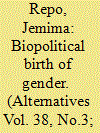

|
|
|
|
|
| Publication |
2013.
|
| Summary/Abstract |
This article argues that gender was invented in the 1950s as a new sexual apparatus of biopower. Through a reading of mid-century sexological studies against the background of structural-functionalist and behaviorist theories of social order, it shows how gender was born in the clinic to discipline the reproduction of life in new ways. The truth of sex was no longer found in the genitals or mind, but in the contingent cognitive processes of a behavioral control system. The gender apparatus produced systematized protocols for sex reassignment surgeries for infants with ambiguous genitalia and rendered the family a panoptic institution, all to ensure that children were socialized into normative gender roles guaranteeing the continued reproduction of the life of the species. The violence of this new life-administering technology was crystallized in the pedagogical techniques employed by physicians designed to persuade their child patients to submit themselves to the normalizing care of surgeons and psychiatrists.
|
|
|
|
|
|
|
|
|
|
|
|
|
|
|
|
| 2 |
ID:
147384
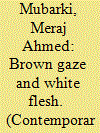

|
|
|
|
|
| Summary/Abstract |
This paper posits that the contemporary (re)configuration of the generic white woman of Hindi cinema solely as a spectacle was produced by the nationalist discourse during the colonial encounter. This essay explores both the textual analyses and aesthetic strategies employed in the construction of national imagery of white female subjectivities. My approach is twofold: (i) to chart the historical specificities of the representational construct of the white woman through discontinuous changes occurring across Bombay cinema, and (ii) to explore the white female subjectivities across specific historical and cultural milieu. This paper probes the historicity of the ‘Otherness’ of the white woman in Hindi cinema reviews and re-examines how Hindi cinema constitutes female whiteness. I posit that the representation of the white woman in Hindi cinema as promiscuous and sexually available was constructed within the nationalist discourse of the colonial era and is a continuation of the white memsahib in her absence. It is my position that all that was ‘repressed’ in the Hindu woman resurfaces in the white woman – the racial, sexual ‘Other’, onto whom everything repressed within the self could be projected.
|
|
|
|
|
|
|
|
|
|
|
|
|
|
|
|
| 3 |
ID:
087289


|
|
|
|
|
| Publication |
2009.
|
| Summary/Abstract |
In recent decades, the age of marriage in many minority Muslim communities has risen so that significant numbers of Muslims in these contexts are remaining unmarried into their late 20 s and beyond. As with other communities in Western contexts, Muslim communities have also experienced a rising divorce rate, leading to many more single women. These social and demographic changes, combined with traditional attitudes towards female sexuality and virginity, have led to a rise in the number of women who have either never had a sexual encounter or who no longer have sexual encounters. Cultural discourses surrounding virginity and female celibacy frequently conflate the virtue of refusing sexual encounters outside of marriage with happiness and satisfaction at 'choosing the right path'. However, these discourses negate or downplay women's sexual desires and result in women often feeling trapped into having to perform the 'myth of the happy celibate'. To disrupt this myth is to unleash the potentially destructive power of female sexuality, while to openly challenge it is to risk being positioned as a 'slut'.
|
|
|
|
|
|
|
|
|
|
|
|
|
|
|
|
| 4 |
ID:
165432


|
|
|
|
|
| Summary/Abstract |
How do peacekeepers operating in Haiti, Liberia, and the Democratic Republic of the Congo (DRC) discursively construct the local people, especially local women, and to what effect? I show a connection between peacekeepers’ representations of local people, articulated in discourse, and the gendered, often sexualized interactions and transactions in peacekeeping sites. Gender plays a central role in peacekeeper discourse. It situates the peacekeeper outside, and superior to, the chaotic, dysfunctional, feminized local. At the same time, a close reading of peacekeepers’ representations of local people disrupts idealized notions of peacekeeper masculinity as protective and benign, which still persist in peacekeeping circles, revealing it as something more vulnerable and brittle. The connection between discourse and (non)performance of peacekeeping duties is neither causal nor straightforward, but I argue that peacekeepers’ discursive constructions of locals affect how peacekeepers interpret their mandate to protect civilians: protection becomes conditional on peacekeepers’ perceptions of locals’ appearance, affect, behavior, and their ability to act out an idealized role as someone “worth” protecting. The article thus brings new insight to our understandings of gender, masculinities, and protection failures in peacekeeping.
|
|
|
|
|
|
|
|
|
|
|
|
|
|
|
|
| 5 |
ID:
102074


|
|
|
| 6 |
ID:
140117
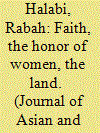

|
|
|
|
|
| Summary/Abstract |
This study investigates the status of the Druze women in Israel, focusing on the effects of the frequent interactions between the Druze and the more permissive Jewish-Western society. The main question posed is why Druze women accept the double standards of freedom, especially on sexual morality, that expect them to be chaste but allow sexual freedom to men. I argue that this is a patriarchal deal, in which women trade their sexual freedom in exchange for access to higher education, and to the prestigious status of moral guardians from western temptations. The paper is based on narrative analysis of in-depth interviews conducted with 50 Druze students, half of them male and half female, enrolled in Israeli universities.
|
|
|
|
|
|
|
|
|
|
|
|
|
|
|
|
| 7 |
ID:
086817


|
|
|
|
|
| Publication |
2009.
|
| Summary/Abstract |
Of all the truly seismic shifts transforming daily life today deeper than our financial fissures, wider even than our most obvious political and cultural divides one of the most important is also among the least remarked. That is the chasm in attitude that separates almost all of us living in the west today from almost all of our ancestors, over two things without which human beings can not exist; food and sex.
|
|
|
|
|
|
|
|
|
|
|
|
|
|
|
|
| 8 |
ID:
087286
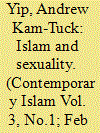

|
|
|
|
|
| Publication |
2009.
|
| Summary/Abstract |
Academic and popular discourses of Islam and Muslims, particularly within the
Western context, tend to focus on macro issues such as multiculturalism, community
integration, political management, and governmental policies. This scenario is
primarily propelled by the geopolitical sensitivities surrounding a key question-
what Turner (2007: 123) has called 'the management of Muslims'. Under this
climate, some may consider the examination of sex and sexuality inconsequential
and insignificant, at best an endeavour within the confines of theology and ethics
(good works in this area include e.g. Ali 2006; Wadud 2006). Yet, as scholars such
as Plummer (2003) and Richardson (2000) have rightly pointed out, although issues
about sexuality are seemingly personal, private, and intimate, they have a significant
public and policy dimension because they are related to our status and rights as
citizens, thus inextricably linked to other aspects of social life. I am therefore
grateful to Gabriele Marranci for inviting me to edit this special collection which
aims to illuminate a grossly under-studied aspect of Muslim lives.
|
|
|
|
|
|
|
|
|
|
|
|
|
|
|
|
| 9 |
ID:
090855


|
|
|
|
|
| Publication |
2009.
|
| Summary/Abstract |
Although female candidates have achieved parity on some dimensions, political institutions remain deeply gendered in how they structure the parameters of electoral competition. We rely on a new data set of gubernatorial races from the 1990s to address the theoretical and empirical challenges created by the interaction of gender, media content, and electoral institutions. Based on an analysis of 1,365 newspaper articles for 27 contests in which a woman held a major party nomination, we uncover evidence of continuing bias in media coverage. Yet significant coefficients on candidate sex tell only part of the story. Gendered contextual factors linked to the contest and state in which candidates compete, as well as the newspapers that cover their races, also affect women's experiences on the campaign trail. The major finding, however, is the presence of a powerful baseline effect favoring male candidates that is deeply embedded in U.S. politics. All else equal, women gubernatorial candidates suffer a substantial vote deficit that results from non-observable influences. The results support the emerging consensus among feminist theorists that greater focus on the political context is likely to produce bigger scholarly payoffs than is continued attention to observable differences between male and female candidates.
|
|
|
|
|
|
|
|
|
|
|
|
|
|
|
|
| 10 |
ID:
165791


|
|
|
| 11 |
ID:
087178
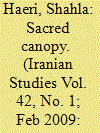

|
|
|
|
|
| Publication |
2009.
|
| Summary/Abstract |
In this article I describe what I see as the subliminal messages of desire and intimacy in the following Iranian movies: Gabbeh (1995), The Blue Scarf (1994), May Lady (1997), and Born in the Month of Mihr (2000). I argue that although the Islamic legal discourse has reasserted itself after the revolution of 1979 and appears to have become dominant, the "erotic" discourse that is ever so subtly embedded in Persian poetry and popular culture is alive and possibly thriving. Taking a light-hearted approach, I discuss representations of love and sex in these four films within the context of the dynamic tension between the legal discourse that regulates the gaze, ahkam-i nigah, and the erotic discourse that subverts the very same regulations, nazar-bazi
|
|
|
|
|
|
|
|
|
|
|
|
|
|
|
|
| 12 |
ID:
094412


|
|
|
|
|
| Publication |
2010.
|
| Summary/Abstract |
Theoretical insights from evolutionary psychology and biology can help academics and policymakers better understand both deep and proximate causes of Islamic suicide terrorism. The life sciences can contribute explanations that probe the influence of the following forces on the phenomenon of Islamic suicide terrorism: high levels of gender differentiation, the prevalence of polygyny, and the obstruction of marriage markets delaying marriage for young adult men in the modern Middle East. The influence of these forces has been left virtually unexplored in the social sciences, despite their presumptive application in this case. Life science explanations should be integrated with more conventional social science explanations, which include international anarchy, U.S. hegemony and presence in the Middle East, and culturally molded discourse sanctioning suicide terrorism in the Islamic context. Such a consilient approach, melding the explanatory power of the social and life sciences, offers greater insight into the causal context of Islamic fundamentalist suicide terrorism, the motivation of suicide terrorists, and effective approaches to subvert this form of terrorism.
|
|
|
|
|
|
|
|
|
|
|
|
|
|
|
|
| 13 |
ID:
141075
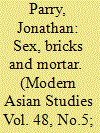

|
|
|
|
|
| Summary/Abstract |
Based on a case study of informal sector construction labour in the central Indian steel town of Bhilai, this paper explores the intersection and the mutually constitutive relationship between social class on the one hand, and gender (and more specifically sexual) relations on the other. It is part of an attempt to document and analyse a process of class differentiation within the manual labour force between aspirant middle class organized sector workers and the unorganized sector ‘labour class’. With some help from the (pre-capitalist) ‘culture’ of their commonly work-shy men-folk, their class situation forces ‘labour class’ women onto construction sites where they are vulnerable to the sexual predation of supervisors, contractors and owners. That some acquiesce reinforces the widespread belief that ‘labour class’ women are sexually available, which in turn provides ‘proof’ to the labour aristocracy that they themselves are a different and better breed, superior in culture and morals. Class inequalities produce a particular configuration of gender relations; gender relations (and in particular sexual relations) produce a powerful ideological justification for class differentiation. This proposition has strong resonances with processes reported from other parts of the world; but in the Indian context and in its specific focus on sex it has not been clearly articulated and its significance for class formation has not been adequately appreciated.
|
|
|
|
|
|
|
|
|
|
|
|
|
|
|
|
| 14 |
ID:
098998
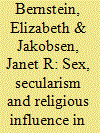

|
|
|
|
|
| Publication |
2010.
|
| Summary/Abstract |
Through an analysis of alliances between secular and religious actors in US politics and a specific case study on anti-trafficking policy, we show that the intertwining of religion and politics in the US comes from two sources: 1) the secular political and cultural institutions of American public life that have developed historically out of Protestantism, and which predominantly operate by presuming Protestant norms and values; and 2) the direct influence on US politics of religious groups and organisations, particularly in the past quarter-century of lobby groups and political action committees identified with conservative evangelical Christianity. The sources of policies that promote gender and sexual inequality in the US are both secular and religious and we conclude that it is inaccurate to assume that religious influence in politics is necessarily conservative or that more secular politics will necessarily be more progressive than the religious varieties.
|
|
|
|
|
|
|
|
|
|
|
|
|
|
|
|
| 15 |
ID:
099451
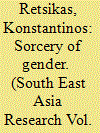

|
|
|
|
|
| Publication |
2010.
|
| Summary/Abstract |
Drawing on ethnographic material from East Java, Indonesia, this article examines the intersections of sorcery and gender and suggests that sorcery is a form of exchange, which, as well as inducing misfortune, pain and death, evinces gender. Key here are the invocation and inversion of marriage transactions and wedding rituals, and an underlying conception of the person as inherently androgynous. The article also calls for sorcery and other manifestations of violence to be moved away from the margins and towards the centre of anthropological descriptions of Javanese sociality.
|
|
|
|
|
|
|
|
|
|
|
|
|
|
|
|
| 16 |
ID:
177717
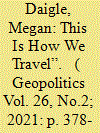

|
|
|
|
|
| Summary/Abstract |
“Movements back and forth […] between cities, between continents, and across oceans and rivers have made travellers of us all,” posits Ruth Behar, “even Cubans who only dream of going places.” In Cuba since the dawn of the twenty-first century, socio-economic change is rapid, continuous, and uncertain, but one constant is the near-absolute spectre of the border. The idea of intimate liaisons with foreigners as a kind of “travel” serves as a jumping-off point in this article, where the stories of locals and foreigners who pursue romance, love, and sex across borders of all kinds serve to make visible the connections between the intimate and the international. The Cuban setting makes everyday emotional, affective, and sexual practices – and the body itself – a particularly fertile ground for resistance, as well as a lightning rod for disciplinary action, with the potential to enact or disrupt structures of the border through the mechanisms of sex and body – and of pleasure. Through an exploration of pleasure as powerful and political, the intimate – often sidelined as a “feminine” and apolitical sphere – can be revealed as a productive and radically relational mode, a vector of international and transnational relations, and a fertile ground for resistance. As bordering practices assert themselves in multiple and evolving ways both externally (travel restrictions) and internally (social and economic divisions between Cubans and foreigners), this article explores how bodies become a means of circumventing and reinscribing those same geopolitical, ideological, and sexual borders policed by states.
|
|
|
|
|
|
|
|
|
|
|
|
|
|
|
|
| 17 |
ID:
100316
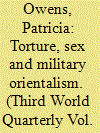

|
|
|
|
|
| Publication |
2010.
|
| Summary/Abstract |
This article revisits the debate about recent American torture practices, particularly the use of discredited anthropological texts to validate long-held Orientalist assumptions about the sexual vulnerability of Muslim males. Such practices are placed in an historical context of older imperial constructions of sexually deviant Muslims as well as of more general forms of gendered and sexual subordination required for war. American torturers intended to produce very particular objects of torture-ones willing and able to confess their 'true' orientation in terms of a binary hetero/homo sexual code established in 19th-century Europe. The torturers had the power to confirm through confession and re-enactment their crude assumptions, irrespective of the actual sexualities of those being tortured, with consequences for the transnational and reactionary politics of sexual identity.
|
|
|
|
|
|
|
|
|
|
|
|
|
|
|
|
| 18 |
ID:
177195
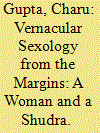

|
|
|
|
|
| Summary/Abstract |
This article centres on the Hindi sexology writings of a woman, Yashoda Devi, and a Shudra, Santram B.A. In the context of an efflorescence of vernacular sexology literature in early twentieth-century North India, it explicates how their writings moved along different registers, whereby they envisaged a heterosexual ethics that relied on utopian and dystopian descriptions of modernity. Sexology in Hindi, particularly when construed from the margins, reified, constructed, destabilised and questioned sexual norms. The article argues that while largely operating within reformist sexology frames, their writings at times punctured dominant upper-caste, male-centric authority and created frictions in normative equations. Together, their writings contribute significantly to creating a vernacular archive of sexual sciences in India.
|
|
|
|
|
|
|
|
|
|
|
|
|
|
|
|
| 19 |
ID:
116493
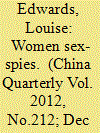

|
|
|
|
|
| Publication |
2012.
|
| Summary/Abstract |
This article examines 70 years of debate about Ding Ling's 1941 influential short story about a woman spy, "When I was in Xia Village." In the article I show that the re-absorption of "our" female spies into post-conflict solidarity narratives is a fraught process. For national governments, the difficulty lies in asserting the moral legitimacy of their rule in the face of evidence about their deployment of women as sex spies. For national populations, the difficulty lies in the desire to construct reassuring victory stories within which peacetime normalcy can be restored. The diverse exegeses around Ding Ling's "Xia Village" reveal that even decades after the hostilities cease, "our" women sex spies still require an explanation to communities seeking to consolidate or "remember" their national virtue. The evolution of this process of "explaining" reveals the on-going importance of sexual morality to governance in current-day China. Specifically, through the analysis of the critiques of "Xia Village" the article demonstrates that female chastity has been and continues to be an important commodity in establishing and sustaining popular perceptions of the moral virtue of the PRC as a nation, and the CCP as its legitimate government.
|
|
|
|
|
|
|
|
|
|
|
|
|
|
|
|
|
|
|
|
|